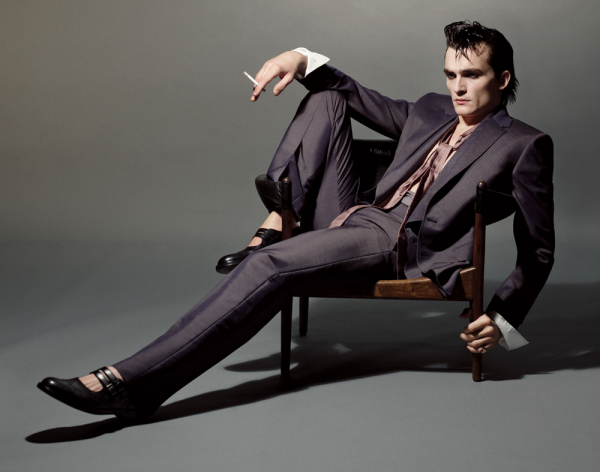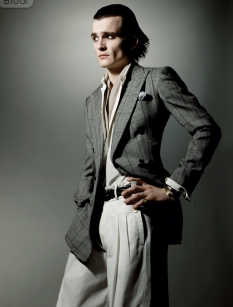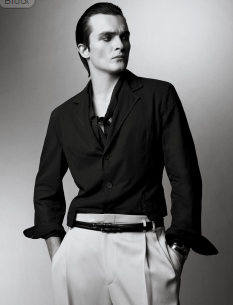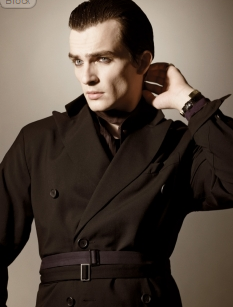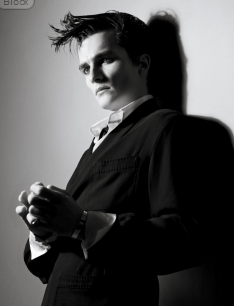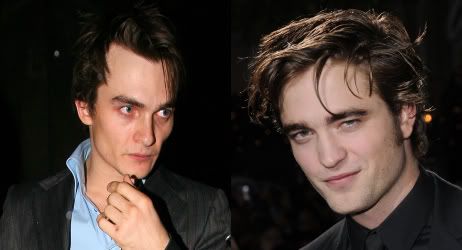Post by DizzyMissLizzie on Mar 7, 2009 11:21:58 GMT -5
All news Rupert-wise*
Rupert Friend in Young Victoira: consorting with royalty
Rupert Friend, Keira Knightley’s squeeze, is set to make his own mark as a famous other half
Prince Albert undefined
Poor Prince Albert. Despite an entire adult life devoted to the British nation, pioneering patronage of the arts and sciences, and ending up with much of a London postcode dedicated to his endeavours, Queen Victoria’s consort is more associated these days — at least according to the results yielded by Google — with an eye-watering item of male genital furniture.
“If you say, ‘I’m playing Prince Albert’, it’s, ‘Oh, have you had it pierced, then?’ That’s the standard response,” says Rupert Friend, who suits up as the Prince Consort in a new film, The Young Victoria. “From what I understand, it was a myth created by a piercing guy who wanted to give a bit of legend to something he had invented. It’s quite a cool idea, because you’ve got this strait-laced German, not exactly a party animal — the idea that he went and got his piercing there is very funny, I think.”
Whichever way you cut it, there’s still something inherently mysterious about the blueblood of Saxe-Coburg. . . and, not forgetting, Gotha. Dead at just 42, Albert is recalled largely as a ghost, one whose widow spent two-thirds of her 63-year reign grieving for him: dressing permanently in black, setting out her late husband’s shaving tackle every morning and mounting a one-woman mission to have every institution, dock, square and pub named in his honour. (Charles Dickens, writing in 1864, wondered whether an “inaccessible cave” existed where he might escape the onslaught of memorials.)
Penned by Julian Fellowes, who wrote Gosford Park, and produced by the unlikely pairing of Martin Scorsese and Sarah Ferguson — it’s based on a pitch by the de-Highnessed duchess — The Young Victoria is an attempt to throw light on the monarch’s earlier, sunnier years, a sort of bookend to Mrs Brown. It stars the in-demand Emily Blunt as a spunky young sovereign, far removed from the unamused majesty of later life: “This vivacious, vitality-filled, danceaholic girl,” as Friend puts it. “I don’t think anyone has any idea of her other than as the 80-year-old widow, and, of course, nobody is born that way. The first thing that registered with me was, ‘What was it about her relationship with Albert that meant she didn’t change out of black for the remainder of her life?’ ”
Before Victoria’s accession to the throne in 1837 — the coronation scene features a brief glimpse of Princess Beatrice as a lady-in-waiting — we find her a frustrated door-slammer of an adolescent, the heir presumptive to William IV (Jim Broadbent) and overly cosseted by her German-born mother, the Duchess of Kent (Miranda Richardson). As a fledgling monarch, she’s prey to the wiles of prime ministers Melbourne (Paul Bettany) and Peel (Michael Maloney), and in desperate need of a co-pilot. Cue Albert, younger of two nephews of the influential king of Belgium.
“His brother was out shagging anything that moved. Albert was the one getting up early to study chemistry. He was the geek,” Friend says. It lent Albert a “pole-up-the-arse quality”, he concedes. “But he was deeply upset by the infidelities of his own parents, which inspired in him a sense of what was right.” Duty and loyalty were his watchwords.
They were spliced at 20, in a no-bones-about-it arranged marriage — Victoria and Albert were first cousins. Indeed, indicative of the “selective” nature of royal husbandry, Elizabeth II and Prince Philip share Victoria as a great-great-grandmother. Nonetheless, it proved a happy union. Albert was the first royal escort to embrace the concept of public service — “Which progresses to opening supermarkets eventually,” Friend says. Or, in the case of his producer, endorsing WeightWatchers.
All mild-mannered introspection and quiet, German-accented chivalry, this is an impressive turn by Friend, who has been quietly coming to the fore as a screen actor. In May, the 27-year-old will be seen in Stephen Frears’s Chéri, set in belle époque Paris, in which he plays the lover of Michelle Pfeiffer’s courtesan. It’s a steady progression from films such as The Moon and the Stars, Outlaw, The Last Legion and Virgin Territory, which, while they didn’t exactly set the world alight, were enough to get the actor serious consideration last time Bond was being cast. “My lips are sealed on that one,” he smirks.
More recently, Friend caused something of a stir as a vicious Nazi officer in The Boy in the Striped Pyjamas — a million miles, one should point out, from the softly spoken, skinny, easy-going chap who is currently picking over a club sandwich in a Covent Garden hotel. It is the attention surrounding his other anointed role, however — that of consort to Keira Knightley — that sits less easily with him. The pair met on the 2005 film of Pride & Prejudice, in which he played the soldier-bounder Mr Wickham to her Elizabeth Bennet.
The paparazzi attract his greatest disdain as he gets impressively protective of his other half: “You have to expect a level of interest if you’re in the public eye. Yet there are young singers and actresses who’ve been driven almost mad by the taunting and the harassment. Take the camera out of the way and you’ve got a stalker.” On his own, he says, it’s a different matter. “I’m never, ever recognised. It happened for the first time this week on the Tube. A girl was looking at me and eventually said, ‘Were you in Pride & Prejudice?’ I said, ‘I was, yeah.’ And she said, ‘Wow, but you’re on the Tube.’ And I went, ‘Yeah. . . It’s faster.’ ”
Such matters seem a long way from the Oxfordshire village where Friend grew up. He fell into drama college by accident; then, out of the blue, he was cast as Billy Downs, the louche gay sidekick in The Libertine. “One minute, you are in college making your own props out of toilet rolls, and suddenly you’re on a film set. Johnny Depp is being sick on your ear.” Given Knightley’s grapplings with Depp on Pirates of the Caribbean, not to mention Friend’s oft-remarked-on resemblance of Orlando Bloom — “Is that good?” he asks — it all gets rather confusing.
Depp rates highly in Friend’s estimation: “His comportment and his skill with the camera were two things that never really left me.”
So, too, does the venerable Joan Plowright, with whom he appeared in Mrs Palfrey at the Claremont, about the unusual friendship between a struggling writer and a Lady in Lavender. “Just by working with someone who is genuinely at the top of their game, yours goes up.”
A film he shot in America, Jolene, in which he plays a New Orleans tattoo artist, is awaiting a UK release date. “They never tell us anything,” he shrugs. In the meantime, he is working on The Kid, about bare-knuckle fighting, a film for which he is currently in the boxing gym every day. With it comes the logistical headache of juggling schedules so that he and Knightley aren’t apart too much, such being the unorthodox lot of the thespian. “It’s weird, because you’ll have nothing to do for six months, then, suddenly, you won’t sleep for three months. You just have to roll with it and be accepting, try to be as understanding as you would like the other person to be for you.”
There may yet be further adventures for Prince Albert. The Young Victoria concludes in 1840, soon after an assassination attempt in which a lone gunman takes a pop at the queen’s carriage. While historians will cringe at the preposterous suggestion that the deed was thwarted only by Albert flinging himself, like Clint Eastwood in In the Line of Fire, to cop the offending bullet, at least the film doesn’t go the whole heroic hog and cite this as the reason for the Prince’s premature demise. Albert is two decades short of developing the nasty chesty cough that will do for him in the end.
“I think there’s room for one more film,” Friend says. “Still to come is the welfare-of-the-poor revolution, the fact that he basically invented the world market, with the Great Exhibition. . . then nine children.” To cover all that in one sitting would have tested the audience’s stamina. “Your bum would have gone numb.”
The Young Victoria opens on Friday
A Rupert Friend indeed
After years of being known as Keira's beau, Rupert Friend is taking his place in the limelight, with starring roles in two new films, writes Stephen Applebaum
Rupert Friend seemingly has a life to envy. Yet the young rising star says that a huge part of how he chooses his roles is "down to my very perverse kind of curiosity that wants to live everybody's life except for my own."
This is not to say that the mild-mannered 27-year-old would always like to be his characters, or even come anywhere near them in real life. Lieutenant Kotler, the menacing Nazi officer in last year's harrowing child-focused Holocaust film The Boy in the Striped Pyjamas, for instance, would presumably come under the heading of someone "I wouldn't like to meet" – which can be as much of a draw for the actor as someone he would. Nevertheless, his revelation about apparently wanting to live these other, imaginary, lives rather than his own is strange and unexpected. It is "a weird thing to say, maybe," he admits.
Indeed, being Rupert Friend cannot be all that bad. Career-wise he is in the ascendant, while in his personal life he has been steadily dating his Pride & Prejudice co-star, Keira Knightley, for years. Tall and handsome, his black T-shirt, brown jeans, distressed leather boots and slightly spiked-up hair give him the look of a front man for an indie band the day we meet, and women clearly adore him. According to Emily Blunt, who plays Queen Victoria to his Prince Albert in The Young Victoria, Friend is the very "definition of a real man". Harriet Walter, meanwhile, has confessed that she "fell in love" with him during the making of the romantic drama. "I wished I'd been 20 years younger and Rupert Friend was a possibility," she reportedly quipped.
If Kotler had been a study in Teutonic evil, then Albert, also a German, was the total opposite: a man so admired for his goodness that he was actually known as Albert the Good in some quarters. "My first question when I read that script," says Friend, "was, 'What makes a woman, after her husband has died, lay out hot shaving water in his room every single day for the next 40 years? What makes her never take the black off? What makes her unable to speak about him without crying?' I just thought, 'That's one of the most moving, posthumous declarations of love that I have ever come across.'"
The actor says he spent a lot of time hanging around Albert's statue in Hyde Park, London - "which sounds weird," he laughs – just thinking about what kind of man would inspire such a memorial. "The idea that you would build that monument – how great was this guy? I just found him one of the most unsung heroes that I have found in history or literature."
The problem for Friend, however, was making Albert a rounded character; he had to get beyond Victoria's tears and weeds and find the man. "It's tricky because you're playing a good guy; it could be nauseating. So you've got to find what the dark side is," he explains. "And the dark side is he was quite a take-over kind of guy. You see that in the film. He'd occasionally tread on [Victoria's] toes a bit in public. He was a king without a crown. He basically said, 'In marrying this woman I will never be the king.' And that for a man who was already going to be the prince of his province is a big deal, I think. But I was full of admiration for him."
I want to ask if he identified with Albert, as the partner of the more-famous Knightley, but Friend has made it a rule never to talk about their relationship to journalists. In any case, he is fast becoming a star in his own right following roles in The Libertine, opposite Johnny Depp, Pride & Prejudice, and The Boy in the Striped Pyjamas, among others. In May he will be seen playing Michelle Pfeiffer's louche young lover in Stephen Frears' and Christopher Hampton's frothy Colette adaptation, Cheri. "It was terrifying," he says, recalling his feelings before meeting Pfeiffer. "I mean, this is Cat Woman we're talking about here."
If Friend's rise through the ranks to leading man since leaving London's Webber Douglas Academy of Dramatic Art seems to have been effortless and struggle free, the actor says looks are deceiving. He has been "really, really lucky", he admits, and "worked with some fascinating, wonderful people. But if I'm honest, and I'm not doing a 'pity me' act, there were some huge swathes of depression in the middle of that."
His packed-looking CV actually represents five years' work, "and in every one of those years, without fail, I was unemployed for six months." These were difficult periods, he says, because he did not know what to do with himself. "Do I go and learn a new skill? Then I'm sort of giving up. Do I work in a bar? Then I'm probably going to be all tired out and won't be any good at auditions. Or do I just try and eke out the money from the last job, and how do you deal with yourself when someone isn't telling you what to do?"
I suggest that what Friend is essentially describing is the vicissitudinous life of a freelancer, something I completely understand. "Absolutely," he says. "My father started his own business and before that was a freelance lecturer, and my friends are artists and musicians, they don't have real jobs, none of us have real jobs," he laughs, "and it's really a process of trying to realise that it's not dead time, it's time that you can use to do the things that you don't do when you're working." Which would be what in his case? "I'd always wanted to work with wood, so a big thing for me was thinking, like, 'Okay, then instead of thinking I'm unemployed, I can try and do something with wood.'"
Friend gives a surprised laugh when I tell him that Jake Gyllenhaal also once told me that he enjoys doing carpentry when he is not filming. "Ah, maybe we can get together and make a bench," he chuckles. "I'm not very good, though. So I will be shown up in a big way."
One thing he will not be making is a cross for his own back, metaphorically speaking, of course, by putting himself in a position where he becomes a fixture in the gossip mags. "I only do the press for the work," he says. "I don't have a publicist. I don't go to events or self-promote, or endorse things, or whatever it is people are meant to do in that world. It's great to sit and talk about the films and the people I work with, rather than where I buy my socks or whatever."
His private life is so off limits in fact that when I suggest that having a partner who is also in the movie business must make his life easier because she presumably understands the pressures of a film actor's life, Friend completely ignores the implied reference to Knightley.
"This industry is too bonkers to understand," he says simply. "Every single part is completely different. I've never got a part in the same way twice. I've never prepared the same way. I've never experienced the filming the process the same way. So I think it's almost impossible to make a rule for it."
Friend cannot evade the paparazzi's lenses as easily as the meaning of my question, however. And while he seems reluctant to complain about them on his own behalf, he gallantly steps up on behalf of actresses. Friend must have been a first-hand witness to their impact on Knightley's life, but he keeps his comments general.
"It's particularly distressing to me to observe that we're fine with these young women, who it normally is, who are chased, stalked, put under siege by battalions of strange men who sleep in their car and follow them and take pictures up their skirts, and when they throw the dummy out or whatever, everyone thinks they've gone mad," he says. "I would defy anyone not to be affected by what is, I think, harassment really. I just think it's slightly below a moral code that I have as a man or as a human being. To chase people, it just seems very bestial."
It's easy to see why the ladies love Rupert Friend.
'The Young Victoria' is released 6 March; 'Cheri' will open 8 May
*he said it...right there*
Rupert Friend in Young Victoira: consorting with royalty
Rupert Friend, Keira Knightley’s squeeze, is set to make his own mark as a famous other half
Prince Albert undefined
Poor Prince Albert. Despite an entire adult life devoted to the British nation, pioneering patronage of the arts and sciences, and ending up with much of a London postcode dedicated to his endeavours, Queen Victoria’s consort is more associated these days — at least according to the results yielded by Google — with an eye-watering item of male genital furniture.
“If you say, ‘I’m playing Prince Albert’, it’s, ‘Oh, have you had it pierced, then?’ That’s the standard response,” says Rupert Friend, who suits up as the Prince Consort in a new film, The Young Victoria. “From what I understand, it was a myth created by a piercing guy who wanted to give a bit of legend to something he had invented. It’s quite a cool idea, because you’ve got this strait-laced German, not exactly a party animal — the idea that he went and got his piercing there is very funny, I think.”
Whichever way you cut it, there’s still something inherently mysterious about the blueblood of Saxe-Coburg. . . and, not forgetting, Gotha. Dead at just 42, Albert is recalled largely as a ghost, one whose widow spent two-thirds of her 63-year reign grieving for him: dressing permanently in black, setting out her late husband’s shaving tackle every morning and mounting a one-woman mission to have every institution, dock, square and pub named in his honour. (Charles Dickens, writing in 1864, wondered whether an “inaccessible cave” existed where he might escape the onslaught of memorials.)
Penned by Julian Fellowes, who wrote Gosford Park, and produced by the unlikely pairing of Martin Scorsese and Sarah Ferguson — it’s based on a pitch by the de-Highnessed duchess — The Young Victoria is an attempt to throw light on the monarch’s earlier, sunnier years, a sort of bookend to Mrs Brown. It stars the in-demand Emily Blunt as a spunky young sovereign, far removed from the unamused majesty of later life: “This vivacious, vitality-filled, danceaholic girl,” as Friend puts it. “I don’t think anyone has any idea of her other than as the 80-year-old widow, and, of course, nobody is born that way. The first thing that registered with me was, ‘What was it about her relationship with Albert that meant she didn’t change out of black for the remainder of her life?’ ”
Before Victoria’s accession to the throne in 1837 — the coronation scene features a brief glimpse of Princess Beatrice as a lady-in-waiting — we find her a frustrated door-slammer of an adolescent, the heir presumptive to William IV (Jim Broadbent) and overly cosseted by her German-born mother, the Duchess of Kent (Miranda Richardson). As a fledgling monarch, she’s prey to the wiles of prime ministers Melbourne (Paul Bettany) and Peel (Michael Maloney), and in desperate need of a co-pilot. Cue Albert, younger of two nephews of the influential king of Belgium.
“His brother was out shagging anything that moved. Albert was the one getting up early to study chemistry. He was the geek,” Friend says. It lent Albert a “pole-up-the-arse quality”, he concedes. “But he was deeply upset by the infidelities of his own parents, which inspired in him a sense of what was right.” Duty and loyalty were his watchwords.
They were spliced at 20, in a no-bones-about-it arranged marriage — Victoria and Albert were first cousins. Indeed, indicative of the “selective” nature of royal husbandry, Elizabeth II and Prince Philip share Victoria as a great-great-grandmother. Nonetheless, it proved a happy union. Albert was the first royal escort to embrace the concept of public service — “Which progresses to opening supermarkets eventually,” Friend says. Or, in the case of his producer, endorsing WeightWatchers.
All mild-mannered introspection and quiet, German-accented chivalry, this is an impressive turn by Friend, who has been quietly coming to the fore as a screen actor. In May, the 27-year-old will be seen in Stephen Frears’s Chéri, set in belle époque Paris, in which he plays the lover of Michelle Pfeiffer’s courtesan. It’s a steady progression from films such as The Moon and the Stars, Outlaw, The Last Legion and Virgin Territory, which, while they didn’t exactly set the world alight, were enough to get the actor serious consideration last time Bond was being cast. “My lips are sealed on that one,” he smirks.
More recently, Friend caused something of a stir as a vicious Nazi officer in The Boy in the Striped Pyjamas — a million miles, one should point out, from the softly spoken, skinny, easy-going chap who is currently picking over a club sandwich in a Covent Garden hotel. It is the attention surrounding his other anointed role, however — that of consort to Keira Knightley — that sits less easily with him. The pair met on the 2005 film of Pride & Prejudice, in which he played the soldier-bounder Mr Wickham to her Elizabeth Bennet.
The paparazzi attract his greatest disdain as he gets impressively protective of his other half: “You have to expect a level of interest if you’re in the public eye. Yet there are young singers and actresses who’ve been driven almost mad by the taunting and the harassment. Take the camera out of the way and you’ve got a stalker.” On his own, he says, it’s a different matter. “I’m never, ever recognised. It happened for the first time this week on the Tube. A girl was looking at me and eventually said, ‘Were you in Pride & Prejudice?’ I said, ‘I was, yeah.’ And she said, ‘Wow, but you’re on the Tube.’ And I went, ‘Yeah. . . It’s faster.’ ”
Such matters seem a long way from the Oxfordshire village where Friend grew up. He fell into drama college by accident; then, out of the blue, he was cast as Billy Downs, the louche gay sidekick in The Libertine. “One minute, you are in college making your own props out of toilet rolls, and suddenly you’re on a film set. Johnny Depp is being sick on your ear.” Given Knightley’s grapplings with Depp on Pirates of the Caribbean, not to mention Friend’s oft-remarked-on resemblance of Orlando Bloom — “Is that good?” he asks — it all gets rather confusing.
Depp rates highly in Friend’s estimation: “His comportment and his skill with the camera were two things that never really left me.”
So, too, does the venerable Joan Plowright, with whom he appeared in Mrs Palfrey at the Claremont, about the unusual friendship between a struggling writer and a Lady in Lavender. “Just by working with someone who is genuinely at the top of their game, yours goes up.”
A film he shot in America, Jolene, in which he plays a New Orleans tattoo artist, is awaiting a UK release date. “They never tell us anything,” he shrugs. In the meantime, he is working on The Kid, about bare-knuckle fighting, a film for which he is currently in the boxing gym every day. With it comes the logistical headache of juggling schedules so that he and Knightley aren’t apart too much, such being the unorthodox lot of the thespian. “It’s weird, because you’ll have nothing to do for six months, then, suddenly, you won’t sleep for three months. You just have to roll with it and be accepting, try to be as understanding as you would like the other person to be for you.”
There may yet be further adventures for Prince Albert. The Young Victoria concludes in 1840, soon after an assassination attempt in which a lone gunman takes a pop at the queen’s carriage. While historians will cringe at the preposterous suggestion that the deed was thwarted only by Albert flinging himself, like Clint Eastwood in In the Line of Fire, to cop the offending bullet, at least the film doesn’t go the whole heroic hog and cite this as the reason for the Prince’s premature demise. Albert is two decades short of developing the nasty chesty cough that will do for him in the end.
“I think there’s room for one more film,” Friend says. “Still to come is the welfare-of-the-poor revolution, the fact that he basically invented the world market, with the Great Exhibition. . . then nine children.” To cover all that in one sitting would have tested the audience’s stamina. “Your bum would have gone numb.”
The Young Victoria opens on Friday
A Rupert Friend indeed
After years of being known as Keira's beau, Rupert Friend is taking his place in the limelight, with starring roles in two new films, writes Stephen Applebaum
Rupert Friend seemingly has a life to envy. Yet the young rising star says that a huge part of how he chooses his roles is "down to my very perverse kind of curiosity that wants to live everybody's life except for my own."
This is not to say that the mild-mannered 27-year-old would always like to be his characters, or even come anywhere near them in real life. Lieutenant Kotler, the menacing Nazi officer in last year's harrowing child-focused Holocaust film The Boy in the Striped Pyjamas, for instance, would presumably come under the heading of someone "I wouldn't like to meet" – which can be as much of a draw for the actor as someone he would. Nevertheless, his revelation about apparently wanting to live these other, imaginary, lives rather than his own is strange and unexpected. It is "a weird thing to say, maybe," he admits.
Indeed, being Rupert Friend cannot be all that bad. Career-wise he is in the ascendant, while in his personal life he has been steadily dating his Pride & Prejudice co-star, Keira Knightley, for years. Tall and handsome, his black T-shirt, brown jeans, distressed leather boots and slightly spiked-up hair give him the look of a front man for an indie band the day we meet, and women clearly adore him. According to Emily Blunt, who plays Queen Victoria to his Prince Albert in The Young Victoria, Friend is the very "definition of a real man". Harriet Walter, meanwhile, has confessed that she "fell in love" with him during the making of the romantic drama. "I wished I'd been 20 years younger and Rupert Friend was a possibility," she reportedly quipped.
If Kotler had been a study in Teutonic evil, then Albert, also a German, was the total opposite: a man so admired for his goodness that he was actually known as Albert the Good in some quarters. "My first question when I read that script," says Friend, "was, 'What makes a woman, after her husband has died, lay out hot shaving water in his room every single day for the next 40 years? What makes her never take the black off? What makes her unable to speak about him without crying?' I just thought, 'That's one of the most moving, posthumous declarations of love that I have ever come across.'"
The actor says he spent a lot of time hanging around Albert's statue in Hyde Park, London - "which sounds weird," he laughs – just thinking about what kind of man would inspire such a memorial. "The idea that you would build that monument – how great was this guy? I just found him one of the most unsung heroes that I have found in history or literature."
The problem for Friend, however, was making Albert a rounded character; he had to get beyond Victoria's tears and weeds and find the man. "It's tricky because you're playing a good guy; it could be nauseating. So you've got to find what the dark side is," he explains. "And the dark side is he was quite a take-over kind of guy. You see that in the film. He'd occasionally tread on [Victoria's] toes a bit in public. He was a king without a crown. He basically said, 'In marrying this woman I will never be the king.' And that for a man who was already going to be the prince of his province is a big deal, I think. But I was full of admiration for him."
I want to ask if he identified with Albert, as the partner of the more-famous Knightley, but Friend has made it a rule never to talk about their relationship to journalists. In any case, he is fast becoming a star in his own right following roles in The Libertine, opposite Johnny Depp, Pride & Prejudice, and The Boy in the Striped Pyjamas, among others. In May he will be seen playing Michelle Pfeiffer's louche young lover in Stephen Frears' and Christopher Hampton's frothy Colette adaptation, Cheri. "It was terrifying," he says, recalling his feelings before meeting Pfeiffer. "I mean, this is Cat Woman we're talking about here."
If Friend's rise through the ranks to leading man since leaving London's Webber Douglas Academy of Dramatic Art seems to have been effortless and struggle free, the actor says looks are deceiving. He has been "really, really lucky", he admits, and "worked with some fascinating, wonderful people. But if I'm honest, and I'm not doing a 'pity me' act, there were some huge swathes of depression in the middle of that."
His packed-looking CV actually represents five years' work, "and in every one of those years, without fail, I was unemployed for six months." These were difficult periods, he says, because he did not know what to do with himself. "Do I go and learn a new skill? Then I'm sort of giving up. Do I work in a bar? Then I'm probably going to be all tired out and won't be any good at auditions. Or do I just try and eke out the money from the last job, and how do you deal with yourself when someone isn't telling you what to do?"
I suggest that what Friend is essentially describing is the vicissitudinous life of a freelancer, something I completely understand. "Absolutely," he says. "My father started his own business and before that was a freelance lecturer, and my friends are artists and musicians, they don't have real jobs, none of us have real jobs," he laughs, "and it's really a process of trying to realise that it's not dead time, it's time that you can use to do the things that you don't do when you're working." Which would be what in his case? "I'd always wanted to work with wood, so a big thing for me was thinking, like, 'Okay, then instead of thinking I'm unemployed, I can try and do something with wood.'"
Friend gives a surprised laugh when I tell him that Jake Gyllenhaal also once told me that he enjoys doing carpentry when he is not filming. "Ah, maybe we can get together and make a bench," he chuckles. "I'm not very good, though. So I will be shown up in a big way."
One thing he will not be making is a cross for his own back, metaphorically speaking, of course, by putting himself in a position where he becomes a fixture in the gossip mags. "I only do the press for the work," he says. "I don't have a publicist. I don't go to events or self-promote, or endorse things, or whatever it is people are meant to do in that world. It's great to sit and talk about the films and the people I work with, rather than where I buy my socks or whatever."
His private life is so off limits in fact that when I suggest that having a partner who is also in the movie business must make his life easier because she presumably understands the pressures of a film actor's life, Friend completely ignores the implied reference to Knightley.
"This industry is too bonkers to understand," he says simply. "Every single part is completely different. I've never got a part in the same way twice. I've never prepared the same way. I've never experienced the filming the process the same way. So I think it's almost impossible to make a rule for it."
Friend cannot evade the paparazzi's lenses as easily as the meaning of my question, however. And while he seems reluctant to complain about them on his own behalf, he gallantly steps up on behalf of actresses. Friend must have been a first-hand witness to their impact on Knightley's life, but he keeps his comments general.
"It's particularly distressing to me to observe that we're fine with these young women, who it normally is, who are chased, stalked, put under siege by battalions of strange men who sleep in their car and follow them and take pictures up their skirts, and when they throw the dummy out or whatever, everyone thinks they've gone mad," he says. "I would defy anyone not to be affected by what is, I think, harassment really. I just think it's slightly below a moral code that I have as a man or as a human being. To chase people, it just seems very bestial."
It's easy to see why the ladies love Rupert Friend.
'The Young Victoria' is released 6 March; 'Cheri' will open 8 May
*he said it...right there*



